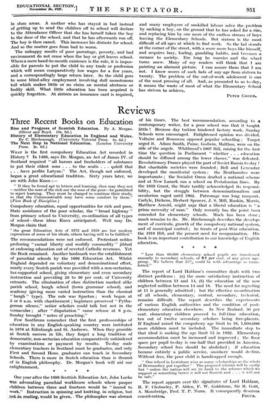Reviews
Three Recent Books on Education
Rise and Progress of Scottish Education. By A. Morgan. (Oliver and Boyd. 10s. Hd.)
History of Elementary Education in England and Wales.
Press. 3s. 6d.)
WHAT is the first compulsory Education Act recorded in
History ? In 1496, says Dr. Morgan, an Act of James IV. of Scotland required " all barons and freeholders of substance to put their eldest sons . . . to the sculis . . . quhill thai . . have perfite Latyne." The Act, though not enforced, began a great educational tradition. Sixty years later, we are with John Knox :-
" If they be found apt to letters and learning, then may they not —neither the sons of the rich nor the sons of the poor—be permitted to reject learning. They must be charged to continue their study, so that the Commonwealth may have some comfort by them." (First Rook of Discipline.)
Compulsory education, equal opportunities for rich and poor, State assistance of the poor scholar, the " broad highway " from primary school to University, co-ordination of all types of school—these ideas Knox anticipated. Well may Dr. Morgan claim that
" the great Education Acts of 1872 and 1918 are but modern expressions of some of his ideals, others having still to be fulfilled."
The recommendations were not enforced. Protestant nobles preferring " carnal liberty and worldly commodity " jibbed at endowing education out of coveted Catholic revenues. Yet the Book remained. Another landmark was the establishment of parochial schools by the 1696 Education Act. Whilst England depended on voluntary and denominational effort, nearly every Scotch parish was provided with a non-sectarian, tax-supported school, giving elementary and even secondary instruction and providing 20 to 30 per cent. of University entrants. The elimination of class distinction marked alike parish school, burgh school (town grammar school), and academy (giving more varied instruction than the classical " burgh " type). The rule was Spartan ; work began at 5 or 6 a.m. with chastisement ; beginners preserved " Pytha- gorean silence," seihii scholais could talk but not in the vernacular ; after " disptitation " came release at 6 p.m. Sunday brought " notes of preaching."
Few Southrons remember that the first professorships of education in any English-speaking country were instituted in 1876 at Edinburgh and St. Andrews. When they grumble at Scotch success in life, they forget a long tradition of democratic, non-sectarian education comparatively unhindered by examinations or payment by results. To-day male elementary teachers in Scotland must be graduates, and only First and Second Hons. graduates can teach in Secondary Schools. There is more in Scotch education than is dreamt of in English philosophy. Dr. Morgan's book will aid our enlightenment. * * * *






















































 Previous page
Previous page